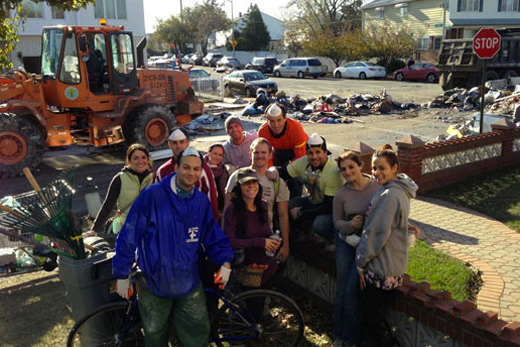
Alumnus Jason Najjoum gathered supplies to be distributed to New Yorkers in need through Fill My Wagon.
Just two blocks from Stephen Kunen's home in Staten Island, the Atlantic Ocean surged forth with a fury, ripping homes from their foundations, leveling structures, and wreaking unprecedented havoc on neighborhoods. "The morning after the storm, we woke up to a different world," Kunen, who graduated in 2011 from Emory Law School, says.
"The area I grew up in was destroyed. Parks I played in were washed away. Restaurants had fallen apart. Sidewalks had collapsed. On our block, the fire department staged rescues in boats, trying to find survivors and pull people from the wreckage. People had stayed in their homes to prevent the same looting that happened after Hurricane Irene. They weren't prepared for what came next."
Kunen's family home was spared the storm's wrath, situated on a hill at the edge of the evacuation zone. In an area that had seen a renaissance of reconstruction, investment progress was eliminated. "Entire houses were washed out to sea. We were in a new age, and it was really sad."
Without reliable communication, Staten Islanders heard little of governmental intervention in the tragedy.
The first day, "We were on our own," Kunen recalls. "People stayed inside. Nobody could get off the island and everything was shut down or covered in thick mud. Gas stations couldn't get fuel and roads were impassable." By day two, when local police officers, firemen, and sanitation workers had become local heroes, "we knew we had to rely on our own. People who have never spoken to one another were suddenly working side by side. We started helping each other, as neighbors."
Kunen mobilized efforts and used a local bowling alley as a gathering point for essential goods.
"We got such a great response we started sorting items into categories to make distribution easier." Later, he and fellow volunteers assembled care packages to deliver. "We trekked through mud to find people who needed help. Trash was everywhere. Sanitation was there with bulldozers and trucks simply trying to clear the roads. Safety was a huge concern."

